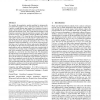Free Online Productivity Tools
i2Speak
i2Symbol
i2OCR
iTex2Img
iWeb2Print
iWeb2Shot
i2Type
iPdf2Split
iPdf2Merge
i2Bopomofo
i2Arabic
i2Style
i2Image
i2PDF
iLatex2Rtf
Sci2ools
POPL
2015
ACM
2015
ACM
Quantitative Interprocedural Analysis
We consider the quantitative analysis problem for interprocedural control-flow graphs (ICFGs). The input consists of an ICFG, a positive weight function that assigns every transition a positive integer-valued number, and a labelling of the transitions (events) as good, bad, and neutral events. The weight function assigns to each transition a numerical value that represents a measure of how good or bad an event is. The quantitative analysis problem asks whether there is a run of the ICFG where the ratio of the sum of the numerical weights of good events versus the sum of weights of bad events in the long-run is at least a given threshold (or equivalently, to compute the maximal ratio among all valid paths in the ICFG). The quantitative analysis problem for ICFGs can be solved in polynomial time, and we present an efficient and practical algorithm for the problem. We show that several problems relevant for static program analysis, such as estimating the worst-case execution time of a ...
Related Content
| Added | 16 Apr 2016 |
| Updated | 16 Apr 2016 |
| Type | Journal |
| Year | 2015 |
| Where | POPL |
| Authors | Krishnendu Chatterjee, Andreas Pavlogiannis, Yaron Velner |
Comments (0)

